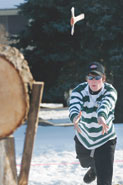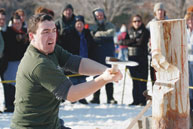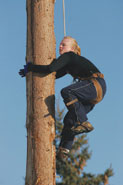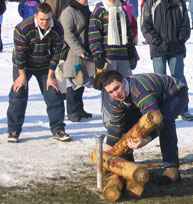A cut above the rest
McGill's Clansmen set to repeat as Canadian champs
It is 6 a.m. at the Morgan Arboretum. The snow along the path is packed so hard even footsteps barely make a sound. A rabbit darts from behind a woodpile and bounces into the safety of a dark stand of trees, kicking up a small puff of powder in its helter-skelter wake. Except for the stars overhead and a lone lamp post illuminating the shed at the end of the path, the forest is black and foreboding. It feels like there isn't a person left on earth.

Tyler Bradley of the Fleming Loggersports Team lets fly during the Axe Throw event of the McGill University Intercollegiate Woodsmen Competition.
Owen Egan
Without warning, the shed door bursts open and people run out, diving onto the cold ground to knock off a series of pushups. Springing back to their feet, they run down the path toward the parking lot. The 16 faces that whiz by are young, determined and, remarkably enough, wide awake. Forty metres down the path, they wheel around and sprint back for more pushups in the snow. One guy isn't even wearing gloves.
Marines at boot camp? Black Ops preparing to save the free world one more time? Nope, just another day at the office for the Clansmen, McGill's Macdonald Campus-based woodsmen, one of Canada's top university timbersports teams. On February 11, the team will compete in Truro, Nova Scotia, in the final event of the Canadian Intercollegiate Lumberjacking Association (CILA) season. While the women's squad is hoping for a top three result overall, the men's team is poised to repeat as the CILA Cup overall champion.
Trial by early morning fire

Patrick MacDougall, Captain of the McGill Clansmen, leans into his swing during the Standing Block Chop portion of the competition helping spur the McGill men's team to its 15th Mac championship in 25 years.
Owen Egan
By the time most Montrealers are rubbing the sleep from their eyes, these lumberjacks and lumberjills will have cut, sawed and chopped through a small forest of lumber. While you're sipping coffee in your housecoat and slippers, they're strapping on metal shin armour to ward off crippling blows from wayward axes. And while you're silently cursing the inconvenience of traffic from the sanctuary of your toasty warm sedan, they're sprinting up 40-foot poles barbed with splinters, wearing cleats that look like bear traps. Football may have its macho cache of blitzes and bombs, but only in lumberjacking does one toss axes sharp enough to shave with and compete in events like Crosscut to Death.
Although the Clansmen have been known to train eight times a week prior to major competitions, coach John Watson (forest operations manager, Morgan Arboretum) believes the regular four pre-dawn sessions are the real catalyst for success. "Other teams train in the afternoon," he sneers, eyes narrowing like a Savannah lion who's just glimpsed a gnu with a limp. "This weeds out the ones who aren't serious."
And make no mistake, these are serious athletes. While the women kick off their workout with a grueling session of log decking - in which pairs of lumberjills haul heavy logs up and down a crude ramp using nothing but a peavie (a dangerous-looking, two-pronged device which must have roots traceable back to the Tower of London) - the men set up for a little crosscut sawing.
Armed with the classic two-man saw, pairs of woodsmen take turns lopping off thin disks (called cookies) of wood from a thick log strapped securely to a saw horse. Among the more experienced pairs, there is a synchronicity and coordination often seen between dancers and hockey linemates - an unspoken complicity that is all but invisible to the untrained eye because its net result makes a difficult task seem effortless. Wood cookies fall to the ground like ash flicked from a giant cigar.
The grace and simplicity of movement becomes even more evident when less experienced teammates hunker down to try their hand. Initially, the saw slides back and forth just as quickly, slicing to the halfway point with similar ease. But somewhere in the final third, the blade wobbles and the teeth bite hard into the wood. The long blade slows and comes to a sudden shuddering stop. Coach Watson grins tightly from beneath his wool cap. "What's the matter, Kyle," he asks. "Too much Scotch last night?" The others chuckle as this young King Arthur tries to disengage his stubborn singing sword.
McGill's greatest team?

McGill's Lise Cobitz scales new heights during the Pole Climb. The U1 Nutrition student says the key to the event is to stick your ass out.
Owen Egan
Although the Clansmen are one of the university's most successful teams (the CILA website claims the Mac woodsmen have "the greatest winning record of all McGill teams"), they toil in relative obscurity - especially beyond the Mac Campus, where the spotlight falls on higher profile sports like hockey, rugby and football. The early morning sessions have accustomed them to working in the dark.
Watson is a Mac man who relishes nothing more than recounting the birth of the team back in 1954, when McGill invited the Macdonald Aggies to compete in its second annual Intramural-Intercollegiate Woodsmen Competition. Despite having but a week to prepare for the event and facing many of McGill's top athletes, the upstart Aggies, coached by Watson's father Bob, came home with the championship hardware. Since then, the team has known only two coaches - the Watsons Senior and Junior.
The athletes themselves don't seem to mind the lack of fanfare - the unique nature of the sport is what attracted them in the first place. "This isn't normal," smiles women's captain, Valerie Quesnel (U2 Farm Management and Technology). "I don't want to chase a ball around a field."
Johnathan Blais (U2 Farm Management and Technology) is a perfect example of someone who has found his athletic calling as a woodsman. In just his second year with the Clansmen, Blais' meteoric rise has put him among the elite Canadian university lumberjacks. "He's not particularly good at other sports," says Watson matter-of-factly, "but he's an exceptional woodsman. If we let him come out at four in the morning, he would." With a good result in Truro, Blais will qualify as one of only two Canadians to compete against U.S. counterparts in the Loggersports Collegiate Invitational, sponsored by STIHL power tools, later this summer.
Risks and rewards

Patrick MacDougall gets ready to heave-ho during the Pulp Throw as teammate Eloi Champagny awaits his turn.
Owen Egan
When asked if everyone on the team has all their body parts, Alison Poirier (U1 Agricultural Economics) smiles. "Mostly," she deadpans as she makes the final adjustments to her metal shin protectors before she takes her turn at the Underhand Chop. "Of course, there was that girl last year who had the episode with the axe." Episode? Questioned further, Poirier describes an unlucky lumberjill who, thanks to an incredibly fluky bounce, managed to hit herself right betweaen the eyes with her own axe blade. "Oh she's OK," reassures Poirier, "but she's got a nice scar."
Between reps of the Quarter Split, Kayla McCann (U2 Farm Management and Technology) vouches for the story's validity. "Yeah, she was pretty lucky," McCann says earnestly. "The doctor actually said if you're going to get hit in the head with an axe, that's the best place to do it." With that, McCann calmly rears back and splits a sizeable chunk of wood in two.
McCann's is one of six stations where woodsmen are plying their diverse trade, chopping, sawing, climbing and throwing. Watson stands back, surveying the scene. "These are all farm kids," he says. "They aren't afraid of hard work. They pitch hay, milk cows, they do their chores. If they weren't serious about this, I wouldn't be out here at six in the morning." Its as close as Watson will get to gushing.
But before Watson lapses into outright sentimentality, he spots a couple of Clansmen talking when they should be chopping. "See that? I'm over here and they're starting to slack," he snarls, stomping down the hard-packed path one more time. The sun is up now, the Clansmen toil in the dark no more.

